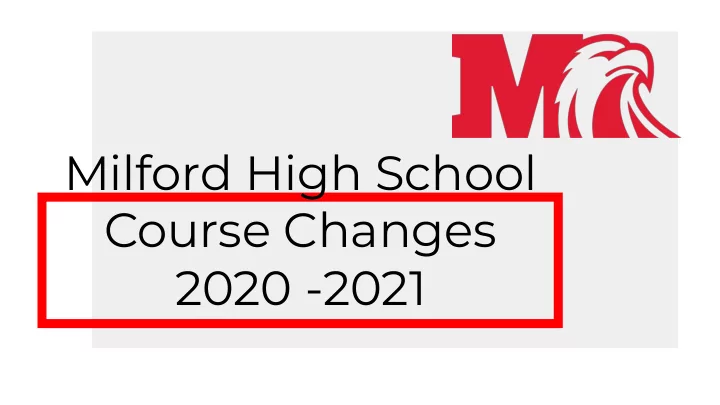

Milford High School Course Changes 2020 -2021
2020 - 2021 □ Math Department, Chair Sarah Metzger □ Social Studies Department, Chair Anna O’Neill
Catalyst for Change □ Teacher Driven □ Project Based Learning Cohorts □ 5-Year Resource Adoption Cycle □ Re-envisioning the secondary experience □ Revisions of State Standards (Social Studies)
Number of New Courses : 8 Names: 1. Math Application in Careers Math 2. Real Life Mathematics 3. Secret Math (Discrete Math) 4. Problem Solving Techniques Department 5. Advanced Problem Solving Techniques 6. Applications of Statistics and Probability 7. ACT Math 8. Research Statistics (Part of AP Capstone)
Number of New Courses : 7 Names: 1. American Studies Social Studies 2. American Government a. Bill of Rights b. Citizenship in Action c. Government in Economics 3. Pop Culture 4. Social Psychology 5. Mock Trial 6. Modern Conflict 7. Local History
□ Daily - Fully Year □ Daily - Semester □ Blended - Semester (2 or 3 Day Electives) Course Formats Course offerings and staffing are driven by student enrollment. Not all courses listed in the catalog may end up being offered due to enrollment.
AP Physics (Algebra 91 Based) Field Ecology 60 Science Forensics 190 Update Human Genetics 43 Infectious Diseases 79 New Courses Oceanography 229 2019 - 2020 Total New Courses 692
What questions might you have about new High School Course Offerings?
Math Curriculum Materials Adoption
Adoption will be used for the □ Math 1 (Grades 7 & 8) following □ Math 2 (Grades 8 & 9) courses: □ Math 3 (Grades 9 & 10) □ Algebra 1 (Grade 9) □ Geometry (Grade 10) □ Algebra 2 (Grade 11)
Financial Responsibility □ New materials are Expenses are for a □ adopted on a five year adoption, revision cycle which is .38% of the district’s annual general fund □ Expenses are budget budgeted as part of the Curriculum and Instruction □ Student Fees on Budget and are consumables are a part of the 5-year factored into the forecast adoption process
Materials Adoption Process □ Must be within our revisions budget timeline □ Work begins with the teachers and looking at resources that align with the Ohio Learning Standards and meet the needs of our students and staff □ Department researches appropriate materials in partnership with our Hamilton County Educational Service Center Math Coach □ Four Options were presented to be vetted by Curriculum and Instruction □ Three vendors were invited to present to eight teachers and academic cabinet □ One universal screening tool was used to accurately caption needs
Materials Adoption Continued □ After the presentations, the committee was asked to refrain from voting but to think of questions they might have or create follow-up questions for the vendors □ Vendors were given follow-up questions to answer □ Committee Members connected with current users both administrators and teachers □ After completing the follow-up questions, a Google Survey of the committee members was conducted □ A clear consensus was reached
The Committee Chose
EdReports.org Scores
Standards for Mathematical Practice 1. Make sense of problems and persevere in solving them. This practice standard is evident every day in every lesson. 2. Reason abstractly and quantitatively. 6. Attend to precision. 3. Construct viable arguments and critique the reasoning of others. 7. Look for and make use 4. Model with mathematics. of structure. 5. Use appropriate tools 8. Look for and express strategically. regularity in repeated reasoning.
Matches our District Philosophy ● Constructivist Approach to Mathematics ● Students need to construct their own understanding of each mathematical concept so that the primary role of teaching is not to lecture, explain, or otherwise attempt to “transfer” mathematical knowledge, but to create situation for students that will foster their making the necessary mental constructions.
Real Time Data and Individualized Student Support
Opportunities for Ongoing Professional Learning
Sharing from a Department Chair Perspective Sarah Metzger
Questions?
Recommend
More recommend